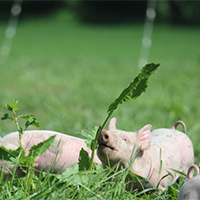Release of handbook in health and welfare in organic pig production
It is possible to improve the health and welfare in organic pig production and at the same time minimize the environmental impact, without any significant additional costs. A newly published handbook shows the farmers how.

Improvements in health and welfare of organic pigs
may be beneficial for the environment
In order to be competitive, organic pig production should have a low environmental impact as well as high standards of animal health and welfare. An improvement of health and welfare in organic pig production should result in reduced environmental impact due to reduced use of medicine, improved growth and higher feed conversion efficiency.
Animal health and welfare can be improved by means of preventive initiatives, optimal treatment of diseases and innovative systems to manage outdoor areas (e.g. vegetation management).
The environmental impact was evaluated in the ProPIG project by means of life cycle assessments of the production chain, and by nutrient balance calculations at farm level and outdoor area level. Regarding the global warming impact, the three production systems did not differ. The variation in environmental impact within the individual production systems was greater than the variation between the three production systems.
Animal health and welfare were evaluated using animal-based parameters, such as clinical assessment, analysis of treatment and productivity data as well as selected behavioural parameters.
The project showed that pigs that were outdoors all year round had advantages regarding respiratory problems, diarrhea in weaners, lameness and MMA in sows. In partly outdoor systems, where sows most of the time are kept outdoors, similar advantages for sow health were observed. However, production systems in which the pigs were indoors all year round displayed the best production results for slaughter pigs.
A handbook for farmers in Europe
By means of specially developed software (PigSurfer), data were collected twice from all herds regarding animal health, welfare, productivity, feeding, economy and environmental impact. The farmers were informed of the results via benchmarking reports as a starting point for setting their own goals and strategies in the form of a farm plan, which was revised during the final visit after one year to allow for continuous development.
Together with existing scientific knowledge, the measures implemented were brought together in the development of a handbook for farmers, which is now available to all organic farmers in Europe with versions in four languages: English, French, German and Czech.
The improvements have been jointly formulated by farmers and scientists and collected in the farmer handbook with the potential to become an effective tool for organic pig producers in the future. Furthermore, the joint European data collected in the PigSUrfer may be used by advisors and decision makers and may prove relevant in relation to future (political) decisions on the development of organic pig production. PigSurfer will be made available on the website in the near future.
ProPIG is funded by CORE Organic II funding bodies. It ended 31 December 2014.
Read the entire article written by Christine Leeb
Read more